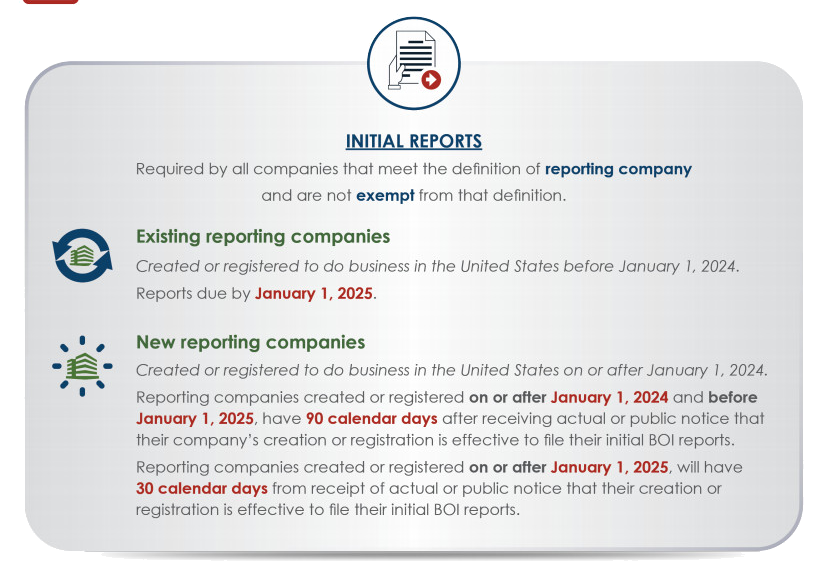If your company existed before January 1, 2024, it must file its initial beneficial ownership information report by January 1, 2025.
If your company was created or registered on or after January 1, 2024, and before January 1, 2025, then it must file its initial beneficial ownership information report within 90 calendar days after receiving actual or public notice that its creation or registration is effective. Specifically, this 90-calendar day deadline runs from the time the company receives actual notice that its creation or registration is effective, or after a secretary of state or similar office first provides public notice of its creation or registration, whichever is earlier.
If your company was created or registered on or after January 1, 2025, it must file its initial beneficial ownership information report within 30 calendar days after receiving actual or public notice that its creation or registration is effective. The following sets out the initial report timelines.
..... SCROLL DOWN FOR MORE INFO .....
HERE'S A USEFUL CHART TO HELP FIGURE THIS OUT
... BUT BE SURE TO KEEP READING BELOW FOR MORE INFO .....

Can a parent company file a single BOI report on behalf of its group of companies?
No. Any company that meets the definition of a reporting company and is not exempt is required to file its own BOI report.
Should an initial BOI report include historical beneficial owners of a reporting company, or only beneficial owners as of the time of filing?
An initial BOI report should only include the beneficial owners as of the time of the filing. Reporting companies should notify FinCEN of changes to beneficial owners and related BOI through updated reports.
How does a company created or registered after January 1, 2024, determine its date of creation or registration?
The date of creation or registration for a reporting company is the earlier of the date on which: (1) the reporting company receives actual notice that its creation (or registration) has become effective; or (2) a secretary of state or similar office first provides public notice, such as through a publicly accessible registry, that the domestic reporting company has been created or the foreign reporting company has been registered.
FinCEN recognizes that there are varying state filing practices. In certain states, automated systems provide notice of creation or registration to newly created or registered companies. In other states, no actual notice of creation or registration is provided, and newly created companies receive notice through the public posting of state records. FinCEN believes that individuals who create or register reporting companies will likely stay apprised of creation or registration notices or publications, given those individuals’ interest in establishing an operating business or engaging in the activity for which the reporting company is created.
How can I obtain a Taxpayer Identification Number (TIN) for a new company within 30 days so that I can file an initial beneficial ownership information report on time?
The Internal Revenue Service (IRS) offers a free online application for an Employer Identification Number (EIN), a type of TIN, which is provided immediately upon submission of the application. For more information on Employer Identification Numbers and to access the EIN online application, see “Apply for an Employer Identification Number (EIN) Online” on the IRS.gov website.
A paper filing is required if a foreign person that does not have an Individual Taxpayer Identification Number (ITIN) applies for an EIN. According to the IRS, receiving an EIN through this process could take six to eight weeks. If you are a foreign person that may need to obtain an EIN for a reporting company, we recommend applying early for an ITIN. Foreign reporting companies that are not subject to U.S. corporate income tax may report a foreign tax identification number and the name of the relevant jurisdiction instead of an EIN or TIN.

DISCLAIMER
Stanley Bronstein is a lawyer and a CPA, but he is not your lawyer or CPA unless and until he is hired by you as your lawyer and/or CPA. The information and opinions contained herein are just that, information and opinions intended to help you learn about and understand your filing requirements under the new Corporate Transparency Act. The information contained herein should not be considered to be the giving of legal advice or accounting advice, unless and until you hire Stanley Bronstein as your lawyer and/or CPA.
Copyright 2024 - Stanley F. Bronstein and fileCTApapers.com
